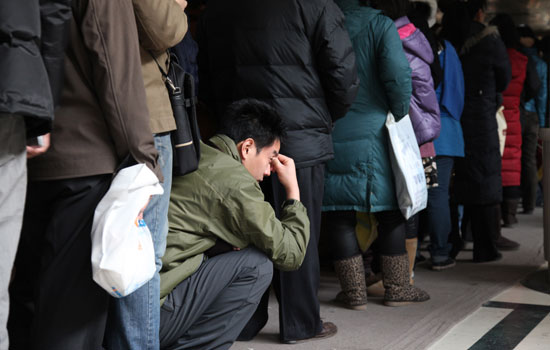|
 |
|
Chinese patients lining up to see doctors at a hospital in Harbin, capital city of Northeast China's Heilongjiang province. While the country is now pouring record amounts of its wealth into health services, it does not run a fully State-funded cradle-to-grave system. Its basic medical insurance covers about half the costs of healthcare, leaving the remainder paid either by patients or their health insurer. [Photo/China Daily] |
Clients are offered a flexible selection of comprehensive plans that cover a wide range of in-patient and day-care treatments, as well as other benefits such as medical evacuation, local ambulance and nursing at home.
"We have adjusted our plans to include, for example, the use of traditional Chinese medicine to reflect the market needs of Chinese people," Buchan said.
Burgeoning business
Allianz's timely decision to offer their very first Chinese-compliant plan allows people in China to buy locally and pay with yuan.
But influential as Allianz is, its health insurance business is very much a latecomer to China.
While many insurance firms recognize the increasing allure of the vast Chinese market, it has only been in the past four years that they began jousting with each other for a share of it, said Zhou Xiye, regional vice-president of global health benefits for Cigna and CMC Life Insurance Co.
Zhou's company is a joint venture established by United States-headquartered insurance provider Cigna Corp, an industry heavyweight specializing in health insurance. It established itself in China in 2003.
"Generally we had two concerns. At first we were not sure whether the market had that much potential but, as expats kept flocking to the country, and companies started using comprehensive healthcare plans as a benefit tool to attract key local talent, we decided to take the first move targeting high-level corporate clients," Zhou said.
The business soon saw a meteoric rise: It enjoyed a compounded growth rate of more than 100 percent in terms of the number of new orders and revenue generated from premiums jumped to second place in China from 2009 to 2011.
Currently it works with more than 200 companies, a majority of which are Fortune 500 firms.
The second concern, Zhou said, was the so-called "return-conscious" mindset that was unique to the Chinese market and that has everything to do with the current social health insurance system.
While the country is now pouring record amounts of its wealth into health services, it does not run a fully State-funded cradle-to-grave system. Its basic medical insurance covers about half the costs of healthcare, leaving the remainder paid either by patients or their health insurer.
This product is known as "group supplementary health insurance" and is the most widely sold health insurance in China.
But Zhou said a "high-end medical insurance" differentiates itself from the group supplementary insurance by reimbursing all medically necessary expenses that fall out of the limited social health insurance plans.
"In general, there is inadequate access to top-tier hospitals and healthcare facilities because patients generally end up paying 60 percent out of their own pockets and often struggle to gain access to high-end care," he said.
While the market gap and the increasing demand do provide growing space for Western insurers, Chinese people usually buy savings-type or high-return products rather than health insurance.
"If one pays extra in addition to the basic social insurance, he or she would like to get a decent return. Chinese clients tend to think of it as pure investment instead of the leverage of risk. That kind of culture has dented its growth," Zhou added.
